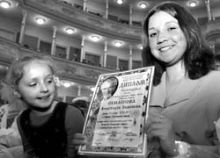On Saturday before last the winners of the Fourth Petro Jacyk International Ukrainian Language Competition were awarded prizes at the Ivan Franko Kyiv National Academic Theater. For more than six months more than five million pupils from various schools, technical schools, colleges, as well as university students and youths from the Diaspora, competed for the title of top native language expert. The competition was divided into nine age groups starting with grade three all the way to grade eleven. Teachers whose pupils took the top three places were awarded special prizes. The winners attended the ceremony with their parents, friends, and relatives. Volodymyr Markovych, a doctor from Uzhhorod, told The Day: “I am very proud that my son came second, and I’m very grateful to the teachers in Vitaly’s high school for their work. The Jacyk competition is uniting not only the citizens of our country, but also linking us with the whole world, because the Ukrainian diaspora is huge. More than two million people in Europe alone speak Ukrainian. This victory has helped to raise the self-confidence not only of my child, but also our entire milieu. If children are achieving such heights, adults have no less of a chance.”
Today the Jacyk competition is an official nation-wide project involving more and more young people with every passing year. Unlike school Olympics, extremely talented pupils compete alongside youngsters from grade three and up. Liubov Matsko, doctor of philology and professor of the Mykhailo Drahomanov National Pedagogical University has headed the jury for several years. Liubov Ivanivna notes that the number of participants is rising steadily, and the geographical parameters of the competition are expanding. “The number of participants from Ukraine’s eastern regions and the Crimea has grown noticeably. Every year the children are demonstrating a higher level of skills in their native language. They no longer have any problems with writing. Today our main emphasis is on teaching young people to express themselves through the Ukrainian language, to apply it creatively, and to view it as an art that may be used in all spheres of life: political, economic, and social. We assign creative tasks that are designed to show how competition participants view the prospects for our country’s development. This is not simply a question of the folkloric beauty of the Ukrainian language, which is also a mechanism for accumulating intellectual knowledge. Certain tasks are designed to verify Ukrainian language skills on the Internet, specifically in terms of obtaining and sending information. We are trying to interest children in the modern, living Ukrainian language, which is penetrating youth slang and other spheres of life.
Nadia Jacyk, the daughter of the well-known Ukrainian Petro Jacyk, the founder of the competition, also came to Kyiv to congratulate the winners. Ms. Jacyk continues actively to support his work. Her twelve-year-old daughter Andriyka is also involved in the competition: she corresponds with some of the winners, which helps to enrich her knowledge of Ukrainian and to obtain first-hand information about her historical motherland. Greeting the participants of the awards ceremony, Nadia Jacyk paid particular attention to the problem of bilingualism. She described the huge financial outlay required to implement official bilingualism in Canada and the incessant debates around the question of having only one official language, which could free up some financial recourses to fund various social programs. “The Ukrainian language competition is helping to spread and establish the language on the territory of the entire country, and is contributing to the identification of Ukraine as an independent state,” says Ms. Jacyk. “Only those countries who have their own identity win on the world markets, while the fragmented ones have no competitive image.”







